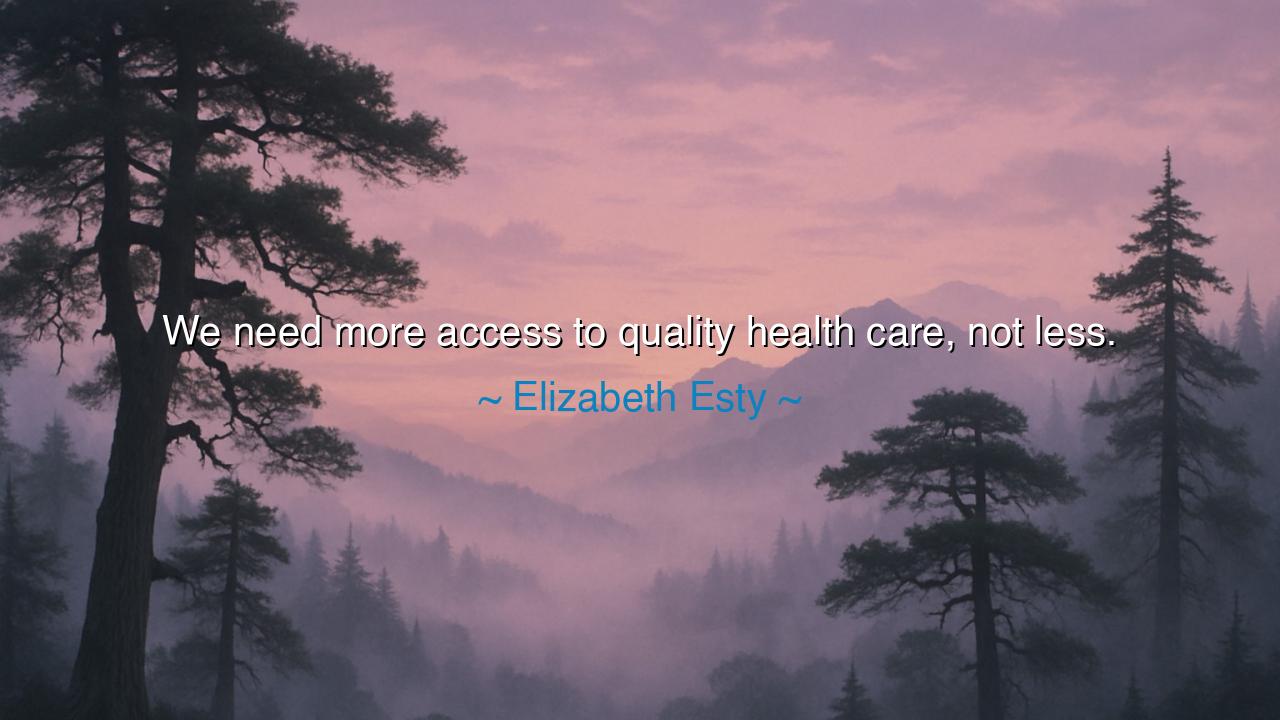
We need more access to quality health care, not less.






“We need more access to quality health care, not less.” – Elizabeth Esty
In this simple yet powerful declaration, Elizabeth Esty, a voice of compassion and public service, speaks a truth as old as civilization itself — that the health of the people is the foundation of the nation. Her words, though modern in their form, carry the spirit of the ancients, who knew that when the body of the community grows sick, the soul of the state begins to falter. Esty calls us back to the moral center — to the sacred duty of ensuring that every person, regardless of wealth or station, has access to care, not as a privilege, but as a human right. Her plea is both practical and spiritual: that the measure of a society lies in how it tends to its suffering, how it guards its weak, and how it uplifts its ill.
The ancients knew this wisdom well. In Greece, the great physician Hippocrates taught that medicine was not merely a craft but a calling — a sacred bond between healer and patient, between society and the human soul. In Egypt, the temples of healing stood beside the temples of the gods, for the people believed that health was divine work, and that to heal the sick was to honor life itself. Esty’s words echo this same eternal understanding — that care is a covenant, not a commodity. When she says, “We need more access, not less,” she reminds us that health systems built upon exclusion are not systems of strength, but of decay.
Her words are also a rebuke to the age of neglect — to the cold arithmetic that measures value in profit rather than in people. In every era, there have been those who sought to ration care, to divide humanity into the deserving and the expendable. But Esty’s wisdom stands against such folly. For she knows that when access to quality health care is denied, it is not only the poor who suffer — it is the very spirit of the nation that weakens. A people who cannot care for one another lose the bond that makes them a people at all. Thus, her statement is not only policy, but prophecy — a warning that to diminish compassion is to diminish civilization itself.
Consider the story of Dr. Elizabeth Blackwell, the first woman to receive a medical degree in America. She lived in a time when access — not only to care, but to learning itself — was denied to many. Yet through perseverance, she broke the barriers of her day, and dedicated her life to bringing medical care to those forgotten by society. She opened clinics for the poor, the immigrant, and the abandoned, proving that true healing belongs not to the few, but to all. Esty’s words breathe that same spirit — that access is the soul of progress, and that the gate of health must stand open to everyone who knocks.
And yet, Esty speaks also of quality, not merely quantity. For what good is a system that reaches many but heals few? True access is not a matter of numbers, but of dignity — of ensuring that each person receives care that honors their humanity. The ancients spoke of arete, the pursuit of excellence in all things. To provide quality health care is to practice this ancient virtue — to bring excellence not to the privileged alone, but to all who dwell under the same sky. Esty’s message, then, is not one of mere expansion, but of elevation — a call to rise above mediocrity and build systems worthy of the people they serve.
Her words carry a rhythm of urgency — “not less” — as if to warn of a tide pulling backward, a regression toward indifference. She reminds us that progress in health is fragile, that what has been gained through struggle can be lost through complacency. The healing of a society requires constant tending, for when we forget the lessons of compassion, inequity creeps once more into the halls of care. Esty’s call is therefore both reminder and rallying cry: that we must never turn away from the work of extending healing hands to those still unreached.
Therefore, children of tomorrow, learn from this wisdom: health is the breath of freedom. Without it, no dream can be pursued, no labor can be sustained, no hope can endure. To safeguard health care for all is to safeguard the future itself. Demand leaders who build bridges, not barriers; who see healing as duty, not as debt. Support the healers, the teachers, the builders of systems that lift every human life. For when every person can seek care without fear or shame, then — and only then — will we stand as a civilization worthy of our name.
And let Elizabeth Esty’s words be carved upon the conscience of every age: “We need more access to quality health care, not less.” For a people who widen the circle of care widen the horizon of hope. To heal one is noble; to heal all is divine. The nations that remember this truth will not merely prosper — they will endure, for compassion is the truest foundation of strength.






AAdministratorAdministrator
Welcome, honored guests. Please leave a comment, we will respond soon